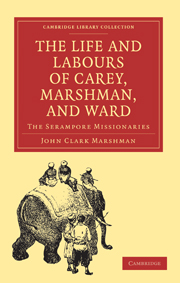Summary
The open hostility to missionary efforts in India was, in a great measure, allayed by the judicious conduct of the missionaries, and Dr Carey was enabled to write to Mr Fuller, soon after the interview with Lord Minto, that Government did not appear to entertain any hostile feeling toward them, though there were individuals in high quarters who wished to crush the Gospel. But a morbid dread of danger from “public preachings” still continued to haunt the Council Chamber. The Armenian and Portuguese attendants at the little chapel in the Chitpore road petitioned Government to grant the Serampore missionaries leave to preach to them in Bengalee, the only language in which they could receive instruction, but the request, however innocent, was positively refused. Dr Carey and his colleagues were required to submit the manuscript of every publication to the public secretary in Calcutta, and as Government was, according to its own allegation, pledged to protect the natives from all molestation in the exercise of their religion, any animadversion on their creed or practice was supposed to come within the scope of the order; but they hoped by patience and perseverance to obtain greater freedom in time. Happily, the restrictions were never rigidly enforced, and were suffered gradually to die out.
- Type
- Chapter
- Information
- The Life and Labours of Carey, Marshman, and WardThe Serampore Missionaries, pp. 162 - 239Publisher: Cambridge University PressPrint publication year: 2010First published in: 1864

